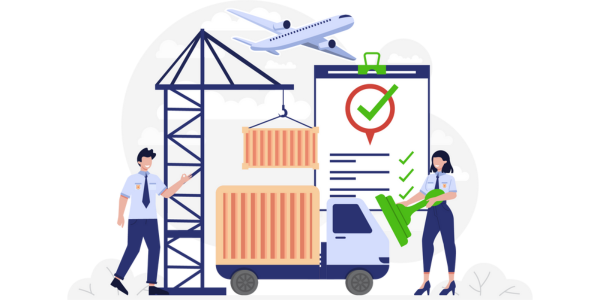Researching customs regulations and shipping requirements is a valuable step in any international shipping endeavor. Throughout this process, you may wonder: What are customs duties? Before shipping across borders, you must first familiarize yourself with the import duties, taxes, and tariffs required to ship your products to your target country successfully. Learning about country-specific duties is likely one of the first questions you will ask your customs broker. Customs duties vary from country to country, so it’s vital to understand the proper regulations to obtain clearance with customs authorities before shipping goods to avoid costly delays, seizures or penalties.
This blog will explore everything from customs duties, taxes, and tariffs, the difference between them, and how to partner with an experienced shipping provider to help you navigate the complicated process seamlessly.

What Are Customs Duties?
Customs duties are fees imposed on goods imported or exported into a country. Every article transported across borders has a specific duty rate set by the corresponding government officials. Factors such as the item’s country of origin, the value of goods, and the quantity determine this rate.
The purpose of a customs duty is to contribute to a country’s economy. Generating revenue for that country’s government allows them to fund public services, protect domestic industries and businesses, and control the movement of goods to prevent the import of prohibited or restricted materials.
When goods arrive at a port of entry, they are subject to a customs clearance process to cross into the country. Just as international travelers must show their I.D. and passport and clear security protocols when traveling to an airport, global goods must also go through an extensive process.
Customs agents will inspect the goods for prohibited materials, verify documentation, collect import duties, and assess if additional fees were not previously paid. The exact rate of duty will vary depending on the importing country and type of product.
Here are a few duties you may encounter when shipping internationally.
Ad Valorem duties: Duty is based on a percentage of the value of the services or goods being imported.
Specific Duties: Duty is assessed on an article at a flat rate per unit of quantity.
Compound Duties: Rate is determined by a combination of both specific duties and ad valorem duties, meaning an item’s duty is based on the number of goods and their quantity.
Every country has varying customs duty rates, and value thresholds from which duties are applicable. For example, when shipping to Australia, any imported goods valued over AUD1000 are subject to paying customs duties.
Most countries have their own ways of calculating duty rates. While there are certain duty-free exemptions, virtually every existing item has a code to help identify the item before shipping. This classification also allows customs authorities to determine duties, taxes, or additional fees applicable to the shipment.

Taxes in International Trade: What You Need to Know
The exchange of goods and services between countries is a complex and multifaceted process. International trade brings many positive advantages to the global economy by allowing countries to expand their markets to new territories, fueling economic growth. But each country has unique rules and regulations to follow when transporting products, with various taxes and fees to be collected. These details are organized in international trade agreements between nations.
The World Trade Organization (WTO) is an international organization that deals with the global rules of trade, acting as a forum for governments to negotiate trade agreements and settle trade disputes. For example, WTO agreements uphold the principles of international trading ventures to prevent countries from finding loopholes in the system, such as exporting a product at a lower price than the amount typically charged in its own home market, also known as “dumping.” The WTO holds anti-dumping agreements, but there are also anti-dumping and countervailing duties that aim to offset the value of subsidization and evening the amount to prevent unfair trading practices.
Further, there are also delivered duty paid (DDP) agreements where the seller is responsible for transporting goods to a destination. For example, if a buyer in Chicago enters into a DDP agreement with a seller from Ireland, the seller in Ireland is responsible for transporting all goods, covering all costs and risks, including import taxes and duties.
The WTO official website offers valuable insight and FAQs regarding trade agreements, however, seeking expert advice from a professional can help you utilize trade agreements in real-time to enhance your growth across international borders compliantly and seamlessly.
Navigating Taxes: Simplifying the International Trade Process
Taxes play a crucial role in shaping the cost structure involved in international trading ventures. The below taxes are considered consumption taxes, which are commonly levied on purchased goods and services.
- Value Added Tax (VAT): A tax assessed on the value added to goods and services.
- Sales Tax: Percentage-based tax imposed on the sale of goods and services.
- Excise Tax: A tax applied to specific goods, such as alcohol, tobacco, and gasoline.
The United Kingdom, France, Germany, and many other countries employ value-added taxes on particular goods and services. European Union (EU) countries have the highest VAT (average 21%), with Hungary holding the top spot at 27% and Germany holding the lowest at 19%.
Since tax rates vary by country, changing regulations and tax percentages can make the international trading process complex. Some countries offer tax incentives or relief to other countries, but trade agreements vary; for example, the United States-Mexico-Canada Agreement (USMCA) is an agreement that aims to create a more balanced trade relationship among the three countries to improve the international shipping process.

Tariffs: An In-Depth Look
A tariff, also known as a duty or tax, is imposed by a country’s government on imported goods from overseas. Tariffs act as another trade barrier to regulate the flow of goods by protecting domestic industries from overseas competition and to price products to help industries remain relevant competitively. In short, tariffs raise imported products’ prices, making consumers more likely to purchase lower-priced items domestically. No country has all the resources necessary to produce everything we need, resulting in trade and diverse tariff rates.
In some cases, countries may agree to a pact known as a free trade agreement between two or more nations to reduce barriers like added import tariffs to simplify the import and export of goods. As discussed above, The USMCA, which replaced the North American Free Trade Agreement (NAFTA), covers the U.S., Canada, and Mexico, and the Central American Free Trade Agreement (CAFTA) includes most of the nations of Central America. China maintains 17 Free Trade Agreements (FTAs), with many more under consideration.
Controlling trade and revenue streams using tariffs dates back centuries to ancient civilizations such as the Roman Empire. And many trade wars are evident today, with the U.S. and Chinese governments battling head-to-head back in 2019 regarding potentially imposed tariffs on particular items. The consequences of this trade war were resolved, but the results of the aftermath are substantial, with China-U.S. trade falling 14.5% in the last year.
Customs Duties vs. Taxes vs. Tariffs: Key Differences
It may be difficult to see the difference between customs duties, taxes, and tariffs, as they are often used interchangeably. The key takeaway is that customs duties, also known as import duties, are exclusive to goods traveling across international borders. In contrast, taxes can be applied to both domestic and imported items.
Customs duties and tariffs are intended to regulate international trade and are typically applied at the point of entry and are collected by customs authorities. Customs duties will vary, as they are calculated differently based on the country’s method, i.e., ad valorem or specific tax. It’s also essential to note that a customs duty is placed on almost all goods imported, whereas a tariff is an additional charge placed on selective items determined by the country’s government.
How to Navigate Customs Duties, Taxes, and Tariffs: Seeking Expert Advice
Navigating the complexities of country-specific customs duties and tariffs is a challenging feat. While it may seem feasible to complete the research alone, there are a host of complications that could arise, including misclassification, added customs duties, and costly shipping delays. A qualified partner can help you understand country-specific regulations and compliance requirements that pertain to your industry and goods.
The Importance of Choosing a Shipping Carrier with Extensive Knowledge
So, what are customs fees? They are one less thing you have to worry about when partnering with ePost Global as your international shipping provider. While accurately defining customs duties, taxes, and tariffs helps you navigate the complex process easier, it may be difficult to do it alone. Partnering with a knowledgeable professional helps simplify the arduous process of determining the applicable fees and, instead, leaves you more time to focus on what really matters for your business.
What qualifies us as your go-to shipping provider is our many years of experience with handling international shipping endeavors and our commitment to excellence, which provides high-quality customer support at every step of our process. Our global shipping center handles all facets of international shipping, including customs duties, country-specific regulations, and tariffs.
We have expert knowledge of shipping to Europe, India, the UK, and beyond, relieving you of the complexities of obtaining customs clearance for your shipments.
Staying informed about customs duties, taxes, and tariffs can mean the difference between a seamless customs clearance process or costly delays and legal fines. Accurately understanding the difference between the above fees and regulations can help you achieve a better process that will be useful for years to come.
If you are ready to ship items internationally with an esteemed partner knowledgeable of global customs duties, taxes, and tariffs, contact us today.




